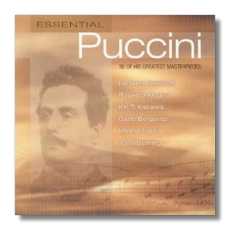
The Internet's Premier Classical Music Source
Related Links
- Puccini Reviews
- Latest Reviews
- More Reviews
-
By Composer
-
Collections
DVD & Blu-ray
Books
Concert Reviews
Articles/Interviews
Software
Audio
Search Amazon
Recommended Links
Site News
 CD Review
CD Review
Giacomo Puccini

Essential Puccini
36 Arias, Duets, and Scenes
Various Singers, Conductors, and Orchestras
Decca 460969-2 ADD/DDD 2CDs: 70:34, 70:53
Giuseppe Verdi is (arguably) the best opera composer, but Giacomo Puccini is the one people love the most. Even if they have no experience with classical music, listeners immediately respond to his melodies, and to his unrestrained emotionality and sense of drama. Even if you don't understand Italian, you can tell that his characters experience human passions such as love, despair, pride, and hate much as you do… only stronger, and more frequently!
This collection contains highlights drawn mostly from complete opera recordings – some currently available, and others not. The prime sources include Karajan's Bohème and Madama Butterfly (both with Pavarotti and Freni), Mehta's Turandot (Sutherland, Pavarotti, and Caballé), and Solti's Tosca (Te Kanawa, Nucci). Aria recordings by Leona Mitchell, Giuseppe di Stefano, Carlo Bergonzi, and Jussi Björling help fill this set out. When an aria doesn't come to a neat end in the context of the whole opera, a concert ending is neatly added on (Pavarotti's "Nessun dorma"), or else we are given a discreet fade-out.
I have had difficulties with Karajan's Bohème and Butterfly; in these recordings, the conductor never seems quite willing to surrender the spotlight, and he calls attention to himself with slow tempos and other self-indulgences. The Rodolfo-Marcello duet from Bohème turns into a taffy-pull, as does the "Flower Duet" from Butterfly. Karajan's willfulness is easier to forgive in the context of excerpts, however, and it's impossible not to be seduced by the languorous sounds that he creates, even if they are not especially Italianate. Kurt Herbert Adler, who conducts Mitchell's arias, also has his feet in the molasses, and the "O mio babbino caro" offered here, gorgeous as it is, must set a record for slowness.
But really, there's nothing in this collection that isn't a pleasure to hear. For me, the most pleasant surprises were the contributions of Kiri Te Kanawa, whose Tosca and Manon Lescaut are both elegant and feminine in the extreme. My only regret is that Renata Tebaldi is represented only by two selections from La fanciulla del west, but I can understand Decca's desire to include more modern recordings. The sound, regardless of the age of the selections (some go back to the 1950s), is just fine.
There are several omissions in the documentation that comes with this set, mostly involving La bohème. Mirella Freni's name has been left off "O soave fanciulla," and Rolando Panerai's name is missing from "O Mimi, tu pił non torni," Everyone involved in performing "Musetta's Waltz" is listed… except the Musetta. (She's Elizabeth Harwood.) No recording dates are given, either.
If I were a beginning collector, I'd be frustrated by the lack of synopses, texts, and translations, as well as by the absence of an essay telling me why Puccini is so wonderful. (The latter is obvious, I suppose.) No, I think this set is for old-time collectors like me who have several complete recordings of all of these operas, but who want to listen to highlights as they drive to the vet or the grocery store, or as they fold the laundry.
Copyright © 2002, Ray Tuttle


















